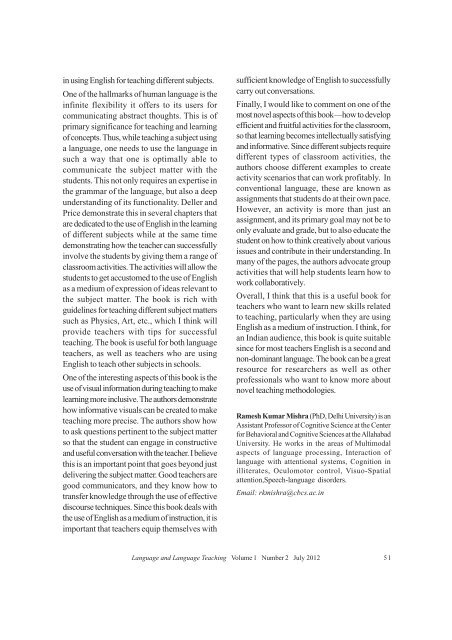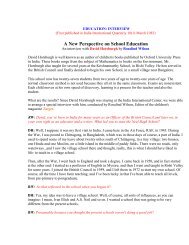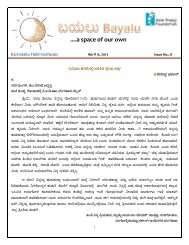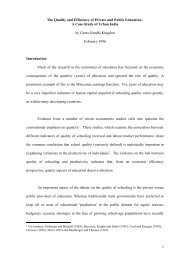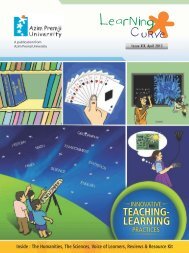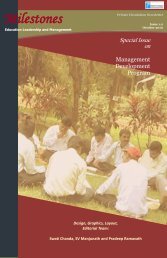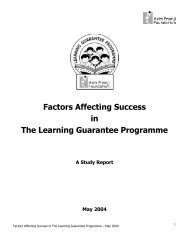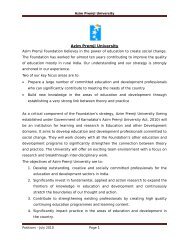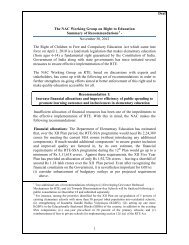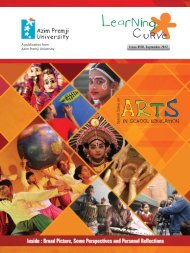Language and Language Teaching, Issue 2 - Azim Premji Foundation
Language and Language Teaching, Issue 2 - Azim Premji Foundation
Language and Language Teaching, Issue 2 - Azim Premji Foundation
You also want an ePaper? Increase the reach of your titles
YUMPU automatically turns print PDFs into web optimized ePapers that Google loves.
in using English for teaching different subjects.One of the hallmarks of human language is theinfinite flexibility it offers to its users forcommunicating abstract thoughts. This is ofprimary significance for teaching <strong>and</strong> learningof concepts. Thus, while teaching a subject usinga language, one needs to use the language insuch a way that one is optimally able tocommunicate the subject matter with thestudents. This not only requires an expertise inthe grammar of the language, but also a deepunderst<strong>and</strong>ing of its functionality. Deller <strong>and</strong>Price demonstrate this in several chapters thatare dedicated to the use of English in the learningof different subjects while at the same timedemonstrating how the teacher can successfullyinvolve the students by giving them a range ofclassroom activities. The activities will allow thestudents to get accustomed to the use of Englishas a medium of expression of ideas relevant tothe subject matter. The book is rich withguidelines for teaching different subject matterssuch as Physics, Art, etc., which I think willprovide teachers with tips for successfulteaching. The book is useful for both languageteachers, as well as teachers who are usingEnglish to teach other subjects in schools.One of the interesting aspects of this book is theuse of visual information during teaching to makelearning more inclusive. The authors demonstratehow informative visuals can be created to maketeaching more precise. The authors show howto ask questions pertinent to the subject matterso that the student can engage in constructive<strong>and</strong> useful conversation with the teacher. I believethis is an important point that goes beyond justdelivering the subject matter. Good teachers aregood communicators, <strong>and</strong> they know how totransfer knowledge through the use of effectivediscourse techniques. Since this book deals withthe use of English as a medium of instruction, it isimportant that teachers equip themselves withsufficient knowledge of English to successfullycarry out conversations.Finally, I would like to comment on one of themost novel aspects of this book—how to developefficient <strong>and</strong> fruitful activities for the classroom,so that learning becomes intellectually satisfying<strong>and</strong> informative. Since different subjects requiredifferent types of classroom activities, theauthors choose different examples to createactivity scenarios that can work profitably. Inconventional language, these are known asassignments that students do at their own pace.However, an activity is more than just anassignment, <strong>and</strong> its primary goal may not be toonly evaluate <strong>and</strong> grade, but to also educate thestudent on how to think creatively about variousissues <strong>and</strong> contribute in their underst<strong>and</strong>ing. Inmany of the pages, the authors advocate groupactivities that will help students learn how towork collaboratively.Overall, I think that this is a useful book forteachers who want to learn new skills relatedto teaching, particularly when they are usingEnglish as a medium of instruction. I think, foran Indian audience, this book is quite suitablesince for most teachers English is a second <strong>and</strong>non-dominant language. The book can be a greatresource for researchers as well as otherprofessionals who want to know more aboutnovel teaching methodologies.Ramesh Kumar Mishra (PhD, Delhi University) is anAssistant Professor of Cognitive Science at the Centerfor Behavioral <strong>and</strong> Cognitive Sciences at the AllahabadUniversity. He works in the areas of Multimodalaspects of language processing, Interaction oflanguage with attentional systems, Cognition inilliterates, Oculomotor control, Visuo-Spatialattention,Speech-language disorders.Email: rkmishra@cbcs.ac.in<strong>Language</strong> <strong>and</strong> <strong>Language</strong> <strong>Teaching</strong> Volume 1 Number 2 July 2012 51


